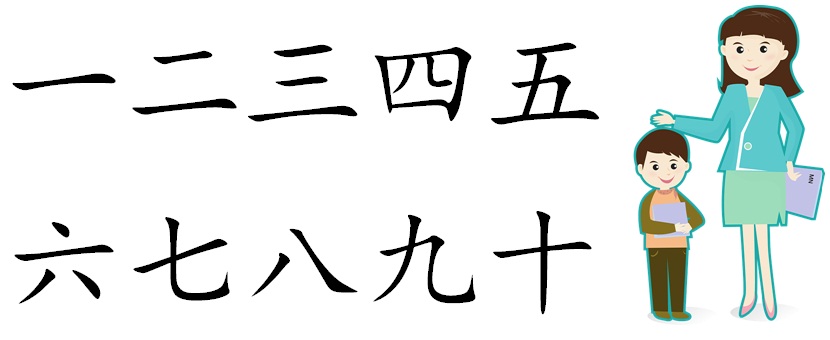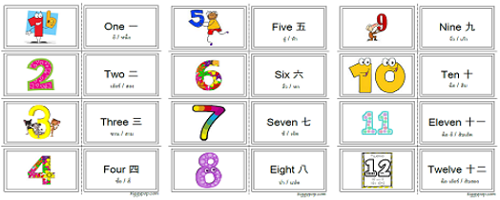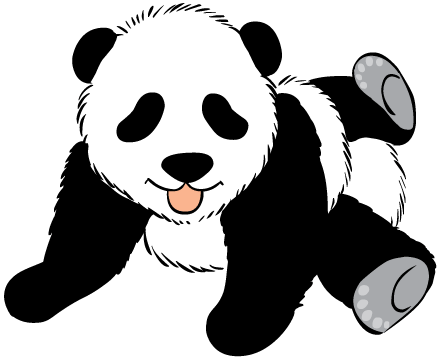Hello everybody!! 大家好 (Dàjiā hǎo)
Welcome back to our Chinese Class by Affy. Today we are going to learn about Chinese characters numbers 1-10 as well as one to ten in English in words.
Let’s get started! 我们开始吧 (wǒmen kāishǐ ba)

Below is number flashcard that I have made for Gemmy and Affy. There are 3 languages English Chinese and Thai. You can simply click on picture to download it as a PDF file. It is totally free to share with anyone who think it might be useful for their kids or class.
Below is a video that Gemmy and Affy learned how to count 1-20 in Mandarin Chinese and how to write number in Chinese characters too.
1 One in Chinese 一
2 Two in Chinese 二
3 Three in Chinese 三
4 Four in Chinese 四
5 Five in Chinese 五
6 Six in Chinese 六
7 Seven in Chinese 七
8 Eight in Chinese 八
9 Nine in Chinese 九
10 Ten in Chinese 十
11 Eleven in Chinese 十一
12 Twelve in Chinese 十二
13 Thirteen in Chinese 十三
14 Fourteen in Chinese 十四
15 Fifteen 四 in Chinese 十五
16 Sixteen in Chinese 十六
17 Seventeen in Chinese 十七
18 Eighteen in Chinese 十八
19 Nineteen in Chinese 十九
20 Twenty in Chinese 二十
And the last video is about how to count and say 1-80 in Chinese and English. There is a trick to learn Chinese number as we will tell you now.
You can notice that eleven (11) in Chinese is “ten one”. Twelve (12) is “ten two”, and so on. You see! it is very easy for other Chinese numbers, if you merely know Chinese number 1-10.
Twenty is “Two ten”, twenty-one is “two ten one” (2*10 + 1), and so on up to 99. That’s easy and fun!!
One-hundred is “one hundred”. One-hundred and one is “one hundred zero one”. One hundred and eleven(111) is “one hundred one ten one”.
Remark that for eleven(11) alone, you only need “ten one” and not “one ten one“, but when used in a larger number (such as 111), you must add the extra “one”. So 111 in Chinese will be one+hundred+one+ten+one.
One thousand and above is done in a similar way, where you say how many thousands you have, then how many hundreds, tens, and ones. For example 2135 in Chinese will be “two+thousand+one+hundred+three+ten+five.
An exception to this is for zeroes. When a zero occurs in the number (except at the end), you need to say “zero”, but only once for two or more consecutive zeroes. So one-thousand and one (101) would be “one thousand zero one”, where zero stands in for the hundreds and tens places. That’s all for Chinese number. From now on, I believe you can say any number in Mandarin Chinese. Just keep practicing many different numbers and that’s it.
| 21 | Twenty-one | 二十一 [เอ้อร์ฉืออี] [èr shí yī] |
| 22 | Twenty-two | 二十二 [เอ้อร์ฉือเอ้อร์] [èr shí èr] |
| 23 | Twenty-three | 二十三 [เอ้อร์ฉือซาน] [èr shí sān] |
| 24 | Twenty-four | 二十四 [เอ้อร์ฉือซื่อ] [èr shí sì] |
| 25 | Twenty-five | 二十五 [เอ้อร์ฉืออู่] [èr shí wǔ] |
| 26 | Twenty-six | 二十六 [เอ้อร์ฉือลิ่ว] [èr shí liù] |
| 27 | Twenty-seven | 二十七 [เอ้อร์ฉือชี] [èr shí qī] |
| 28 | Twenty-eight | 二十八 [เอ้อร์ฉือปา] [èr shí bā] |
| 29 | Twenty-nine | 二十九 [เอ้อร์ฉือจิ่ว] [èr shí jiǔ] |
| 30 | Thirty | 三十 [ซานฉือ] [sān shí] |
| 31 | Thirty-one | 三十一 [ซานฉืออี] [sān shí yī] |
| 32 | Thirty-two | 三十二 [ซานฉือเอ้อร์] [sān shí èr] |
| 33 | Thirty-three | 三十三 [ซานฉือซาน] [sān shí sān] |
| 34 | Thirty-four | 三十四 [ซานฉือซื่อ] [sān shí sì] |
| 35 | Thirty-five | 三十五 [ซานฉืออู่] [sān shí wǔ] |
| 36 | Thirty-six | 三十六 [ซานฉือลิ่ว] [sān shí liù] |
| 37 | Thirty-seven | 三十七 [ซานฉือชี] [sān shí qī] |
| 38 | Thirty-eight | 三十八 [ซานฉือปา] [sān shí bā] |
| 39 | Thirty-nine | 三十九 [ซานฉือจิ่ว] [sān shí jiǔ] |
| 40 | Forty | 四十 [ซื่อฉือ] [sì shí] |
| 41 | Forty-one | 四十一 [ซื่อฉืออี] [sì shí yī] |
| 42 | Forty-two | 四十二 [ซื่อฉือเอ้อร์] [sì shí èr] |
| 43 | Forty-three | 四十三 [ซื่อฉือซาน] [sì shí sān] |
| 44 | Forty-four | 四十四 [ซื่อฉือซื่อ] [sì shí sì] |
| 45 | Forty-five | 四十五 [ซื่อฉืออู่] [sì shí wǔ] |
| 46 | Forty-six | 四十五 [ซื่อฉือลิ่ว] [sì shí liù] |
| 47 | Forty-seven | 四十七 [ซื่อฉือชี] [sì shí qī] |
| 48 | Forty-eight | 四十八 [ซื่อฉือปา] [sì shí bā] |
| 49 | Forty-nine | 四十八 [ซื่อฉือจิ่ว] [sì shí jiǔ] |
| 50 | Fifty | 五十 [อู่ฉือ] [wǔ shí] |
| 51 | Fifty-one | 五十一 [อู่ฉืออี] [wǔ shí yī] |
| 52 | Fifty-two | 五十二 [อู่ฉือเอ้อร์] [wǔ shí èr] |
| 53 | Fifty-three | 五十三 [อู่ฉือซาน] [wǔ shí sān] |
| 54 | Fifty-four | 五十四 [อู่ฉือซื่อ] [wǔ shí sì] |
| 55 | Fifty-five | 五十五 [อู่ฉืออู่] [wǔ shí wǔ] |
| 56 | Fifty-six | 五十六 [อู่ฉือลิ่ว] [wǔ shí liù] |
| 57 | Fifty-seven | 五十七 [อู่ฉือชี] [wǔ shí qī] |
| 58 | Fifty-eight | 五十八 [อู่ฉือปา] [wǔ shí bā] |
| 59 | Fifty-nine | 五十九 [อู่ฉือจิ่ว] [wǔ shí jiǔ] |
| 60 | Sixty | 六十 [ลิ่วฉือ] [liù shí] |
| 61 | Sixty-one | 六十一 [ลิ่วฉืออี] [liù shí yī] |
| 62 | Sixty-two | 六十二 [ลิ่วฉือเอ้อร์] [liù shí èr] |
| 63 | Sixty-three | 六十三 [ลิ่วฉือซาน] [liù shí sān] |
| 64 | Sixty-four | 六十四 [ลิ่วฉือซื่อ] [liù shí sì] |
| 65 | Sixty-five | 六十五 [ลิ่วฉืออู่] [liù shí wǔ] |
| 66 | Sixty-six | 六十五 [ลิ่วฉือลิ่ว] [liù shí liù] |
| 67 | Sixty-seven | 六十七 [ลิ่วฉือชี] [liù shí lqī] |
| 68 | Sixty-eight | 六十七 [ลิ่วฉือปา] [liù shí bā] |
| 69 | Sixty-nine | 六十九 [ลิ่วฉือจิ่ว] [liù shí jiǔ] |
| 70 | Seventy | 七十 [ชีฉือ] [qī shí] |
| 71 | Seventy-one | 七十一 [ชีฉืออี] [qī shí yī] |
| 72 | Seventy-two | 七十二 [ชีฉือเอ้อร์] [qī shí èr] |
| 73 | Seventy-three | 七十三 [ชีฉือซาน] [qī shí sān] |
| 74 | Seventy-four | 七十四 [ชีฉือซื่อ] [qī shí sì] |
| 75 | Seventy-five | 七十五 [ชีฉืออู่] [qī shí wǔ] |
| 76 | Seventy-six | 七十六 [ชีฉือลิ่ว] [qī shí liù] |
| 77 | Seventy-seven | 七十七 [ชีฉือชี] [qī shí qī] |
| 78 | Seventy-eight | 七十八 [ชีฉือปา] [qī shí bā] |
| 79 | Seventy-nine | 七十九 [ชีฉือจิ่ว] [qī shí jiǔ] |
| 80 | Eighty | 八十 [ปาฉือ] [bā shí] |
Remark**
One hundred (100) in Chinese is 一百 [yī bǎi]
and zero in Chinese is 零 [Líng]
We will add more Mandarin Chinese lessons as many as we can, please just stay tuned. And don’t forget to subscribe our YouTube channel to keep updated every day.
Thank you for watching, see you next lesson. Bye bye
谢谢大家 (Xièxiè dàjiā)
再见 (Zàijiàn)
Learning is Fun….
 หน้าแรก
หน้าแรก ฝึกภาษาไทย
ฝึกภาษาไทย ฝึกภาษาอังกฤษ
ฝึกภาษาอังกฤษ ฝึกภาษาจีน
ฝึกภาษาจีน ดาวน์โหลดสื่อการสอน
ดาวน์โหลดสื่อการสอน













